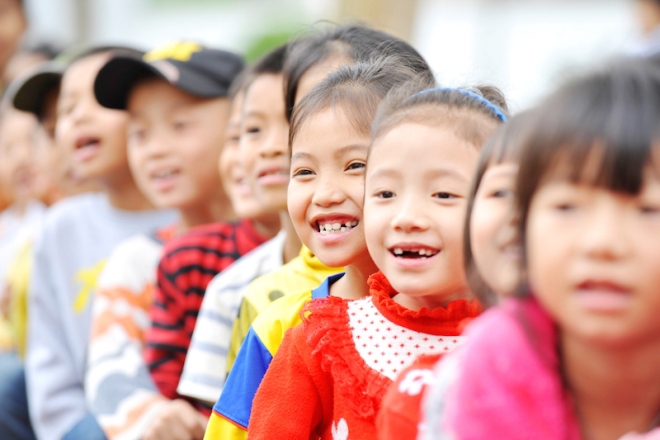June 1, 2017, the 2016 Law on Children officially took effect, emphasizing the importance of protecting children's rights and interests in various fields.
At the 11th session of the XIII National Assembly held on April 5, 2016, the Law on Children was approved, comprising 7 chapters with 106 articles (an increase of 46 articles). Renamed from the Law on Protection, Care, and Education of Children, the Law on Children more comprehensively reflects the content and scope of the Law. The Law introduces many positive, easy-to-understand, and accessible innovations, specifically:
The concept of “children under 16 years old” no longer limits children to being Vietnamese citizens but extends the Law's applicability to include children who are foreign nationals residing in Vietnam. Additionally, 11 concepts are clearly explained, particularly the concepts of the comprehensive development of children, alternative care, child abuse, child sexual abuse, and monitoring the implementation of children's rights according to the opinions and wishes of children...

The 2016 Law on Children adds 46 articles, increasing the total number of articles to 106
New groups of children in special circumstances have been added, such as children severely affected physically and mentally due to violence; exploited children; trafficked children; children with serious illnesses or diseases requiring long-term treatment from poor or near-poor households; migrant children, refugee, and asylum-seeking children without identified parents or without caregivers.
Children have the right to express their opinions when the state formulates policies and laws affecting them, and are prioritized in resource allocation for the implementation and protection of children's rights, including financial and human resources. The prohibited acts added to the law include depriving children of their right to life; obstructing children from exercising their rights and duties; publishing or disclosing information about children's private lives and personal secrets; failing to fulfill the responsibility of supporting children who are at risk or in dangerous situations...
Based on the 2013 Constitution and the United Nations Convention on the Rights of the Child, the Law on Children stipulates 25 groups of children's rights. The increase in the number of children's rights demonstrates the State's and society's concern for the future generation of the country, aligning with the 1989 Convention on the Rights of the Child.
Notably, one of the rights stipulated in the Law on Children is the right to privacy. Children have the right to privacy, personal secrets, and family secrets for their best interests. Children are protected by law in terms of honor, dignity, reputation, privacy of correspondence, phone conversations, telegraphy, and other forms of private communication; protected against unlawful interference with private information (specifically regulated in Decree 56/2017/ND-CP detailing certain articles of the Law on Children).
When they no longer have parents, are not or cannot live with their biological parents, or are affected by natural disasters, catastrophes, armed conflicts, children have the right to alternative care for their safety and best interests. Children can be adopted according to the law on adoption.
Regarding the hot issue of combating child sexual abuse, the law clearly stipulates that children have the right to be protected from all forms of sexual abuse, physical or mental violence, beatings, or abuse, including sexual harassment.
Regardless of their age, children have the right to access full, prompt, and appropriate information; have the right to seek and receive information in various forms as prescribed by law and to participate in social activities suitable to their age, maturity, needs, and abilities. Children have the right to express opinions and hold meetings.
Ensuring that children can form their own views, have the freedom to express those views on all matters affecting them, and that those views be given due weight corresponding to the child's age and maturity is consistent with the convention on children's rights.
In addition to rights, children are required to fulfill their duties to family, school, community, country, and themselves as specified in the Law on Children, in line with the 2013 Constitution's provisions on citizen obligations, Uncle Ho's five teachings for children and youth, and suitable to the requirements of training and nurturing Vietnamese individuals in the new context.
In conclusion, to bring the Law on Children into practical life, certain measures need to be implemented: Coordination among inter-sectoral organizations related to children to ensure effective implementation of children's rights across central agencies, organizations, and localities.
Promote education and awareness campaigns from families to residential communities to help people enhance their awareness, abide by, and respect the law, contributing to the widespread outreach of the Law on Children.
Furthermore, special attention should be given to propaganda in schools so children know how to protect their legal rights and interests when engaging in legal relationships.
Lawyer Pham Thi Bich Hao (Duc An Law Office)
Source: VietNamNet
 Article table of contents
Article table of contents





.Medium.png)
.Medium.png)
.Medium.png)
.Medium.png)
